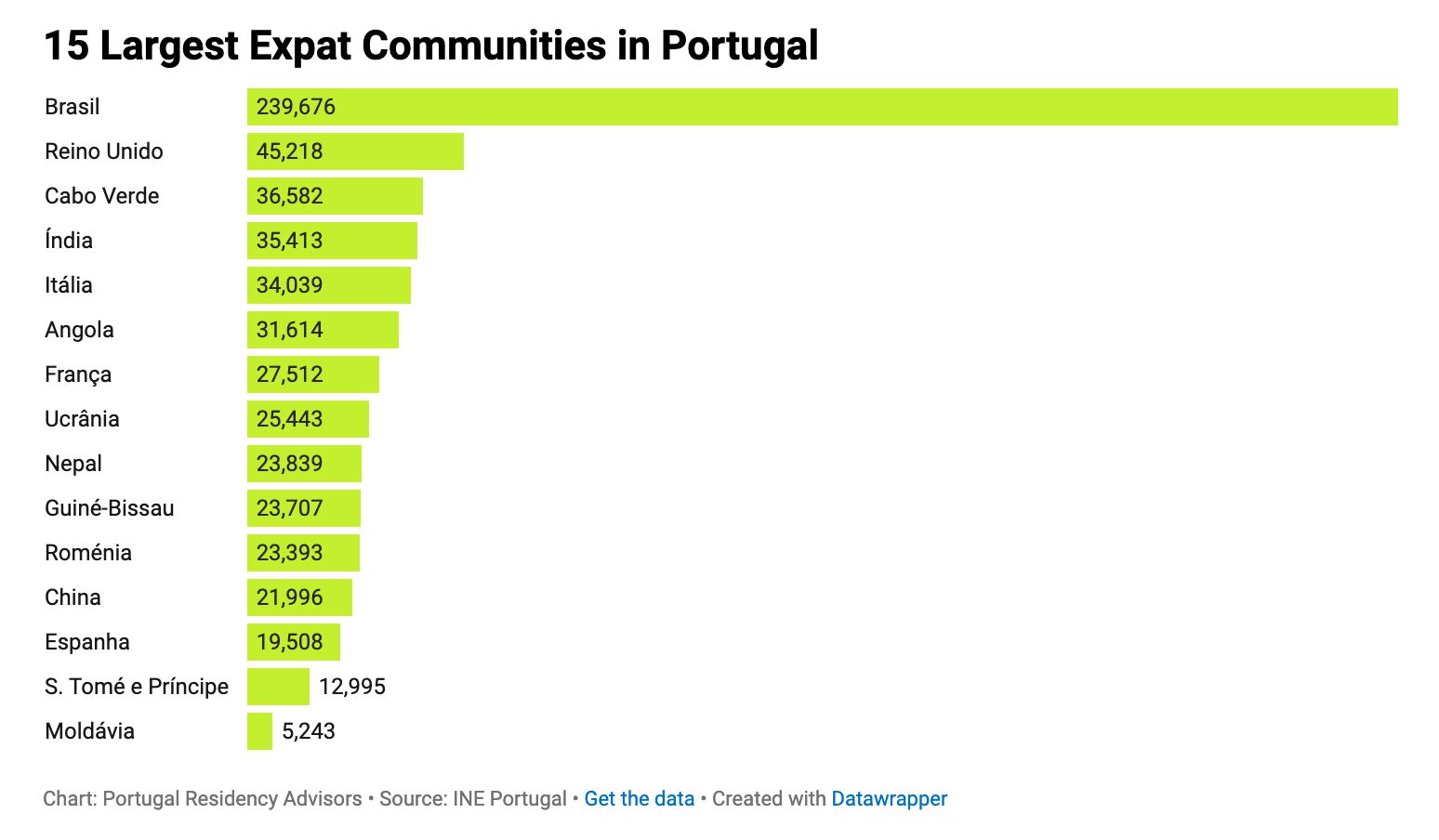
Expat Communities in Portugal
Article by Portugal Residency Advisors - Official legal and Residency partner to KipperTree.
22 08 2023
Read the full article here
In the heart of Portugal’s picturesque landscapes and historic cities, a rich and diverse tapestry of foreign communities has found its place to call home. These vibrant expatriate groups, hailing from countries as far-flung as Brazil, China, the United States, France, Africa, and beyond, have woven their cultures, traditions, and aspirations into the very fabric of Portuguese society.
Against the backdrop of sun-kissed shores, rolling vineyards, and centuries-old architecture, Portugal has become a cherished destination for those seeking new beginnings, professional opportunities, or simply a place to savour the unique blend of international flavours that thrive within its borders.
In recent times, Portugal has experienced a noteworthy surge in its foreign resident population. According to data from the Instituto Nacional de Estatística (INE), the year 2022, in particular, stands as a milestone, with a total of 780,000 legal residents in the country. This figure represents a remarkable 11% increase when compared to the preceding year.

15 Largest Expat Communities in Portugal

Portugal boasts a diverse and thriving expatriate community, with the largest groups representing a rich tapestry of cultures. Leading the way is Brazil, with a substantial 239,676 residents, making up around 30% of the total expat population.
Following closely behind is the United Kingdom, with 45,218 residents, accounting for approximately 5.8% of the expatriate community. In the third spot, Cape Verde contributes 36,582 residents, comprising about 4.7% of the expat population.
Why are foreigners choosing Portugal?
Several factors have contributed to this surge in foreign residents in Portugal:
Quality of Life: Portugal boasts a high quality of life, with a mild climate, stunning coastline, and a welcoming atmosphere. Many foreigners are drawn to the country’s relaxed lifestyle, which offers an excellent work-life balance.
Golden Visa Program: Portugal’s Golden Visa program, which grants residency to individuals who invest in real estate, has been a magnet for wealthy investors from around the world. This initiative has been particularly popular among Chinese, Brazilian, and Turkish nationals.
Tech and Start-up Hub: Lisbon and Porto have gained recognition as burgeoning tech hubs in Europe, attracting professionals and entrepreneurs from diverse backgrounds. The availability of jobs in the tech industry has been a key driver for foreign nationals.
EU Membership: Portugal’s membership in the European Union offers numerous benefits, including access to the Schengen Area and a stable political and economic environment, making it an attractive destination for those seeking opportunities in Europe.
Work Opportunities: An expanding job market, particularly in technology and tourism, has lured professionals and skilled workers. Portugal’s dynamic startup ecosystem has also contributed to this influx.
Geopolitical Stability: Portugal’s stability, as a member of the European Union, has become increasingly attractive in an uncertain global geopolitical landscape.
Benefits of the Influx of Expats in Portugal
Economic Growth: Foreigners often contribute to Portugal’s economy through investments, job creation, and consumption. They may invest in real estate, start businesses, and generate demand for various goods and services.
Cultural Enrichment: Foreign residents bring their unique languages, traditions, cuisine, and art forms, enriching Portugal’s cultural diversity. This can lead to cultural exchange, understanding, and a more vibrant cultural scene.
Innovation and Entrepreneurship: Expatriates, including entrepreneurs and professionals, bring fresh perspectives, ideas, and skills to Portugal’s workforce. They can stimulate innovation and contribute to the growth of sectors like technology and tourism.
Education and Research: Foreign students and academics enrich Portugal’s educational institutions and research centers. They often pursue research projects, collaborate with local researchers, and contribute to knowledge dissemination.
Tourism: Foreign communities attract tourists from their home countries, boosting the tourism sector and fostering international connections.
Diplomatic and Trade Relations: A diverse foreign population can play a role in strengthening diplomatic and trade relations between Portugal and their home countries.
Drawbacks of the Influx of Expats in Portugal
Housing and Property Prices: In areas with a high concentration of foreign residents, there can be increased demand for housing, leading to rising property prices. This can make housing less affordable for local residents.
Cultural Isolation: In some cases, foreign communities may remain relatively isolated from the local culture, leading to cultural enclaves where residents predominantly interact with others from their home country. This can limit integration and cross-cultural understanding.
The strain on Services: In areas with a significant foreign population, there may be increased demand for public services such as healthcare and education. This can put pressure on these services, potentially affecting the quality and accessibility for both locals and foreigners.
Language Barriers: Language differences can sometimes hinder effective communication and integration between foreign communities and the local population. Language barriers may lead to misunderstandings and limited social interaction.
Gentrification: The influx of foreign residents and investment can lead to gentrification in certain neighbourhoods, displacing lower-income residents and altering the character of these areas.
Brazilians in Portugal
Portugal’s rich cultural landscape has been significantly enhanced by the dynamic presence of the Brazilian community, which has experienced remarkable growth in recent years.
According to data from the Instituto Nacional de Estatística (INE), in 2022, Portugal welcomed an impressive 239,676 Brazilian residents, constituting a substantial 31% of the total expatriate community in the country.
This surge represents a significant 17% increase compared to the previous year when the Brazilian expat community numbered 204,669.
Why are Brazilians moving to Portugal?
People from Brazil are drawn to Portugal for a multitude of reasons. Some arrive to pursue higher education in Portugal’s renowned universities. Others seek job opportunities, taking advantage of Portugal’s growing economy and business-friendly environment.
Investment in Portuguese real estate has also attracted many Brazilians, as they explore the potential of the Portuguese property market. Additionally, some have chosen Portugal to reunite with family members who have already established their lives here.
Portuguese Language
Language is a powerful bridge that connects Brazil and Portugal. Portuguese, the official language of both countries, facilitates communication and creates an immediate sense of familiarity for Brazilian expatriates.
This linguistic similarity fosters cultural exchange, as Portuguese and Brazilian cultures share many similarities while maintaining their unique flavours. These cultural affinities are celebrated in Portugal through Brazilian music, dance, cuisine, and art.
Where do Brazilians live in Portugal?
However, several areas are known for having larger Brazilian communities. Lisbon, the capital city, hosts a significant number of Brazilian expats, with neighbourhoods like Amadora, Lumiar, and Cais do Sodré being hubs of activity.
In the Algarve region, cities like Faro and Lagos have also become magnets for Brazilians, drawn by the stunning beaches and thriving tourism industry. University cities such as Lisbon, Porto, and Coimbra are home to many Brazilian students pursuing higher education.
The African Community in Portugal
Portugal, a country known for its historical ties to Africa, has embraced and welcomed a thriving African community within its borders. The African expatriate community in Portugal is a mosaic of cultures, languages, and histories. It encompasses individuals from countries such as Angola, Mozambique, Cape Verde, Guinea-Bissau, and more.
According to data from the Instituto Nacional de Estatística (INE), in 2022, Portugal was home to 124,283 African residents, constituting a substantial 16% of the total expatriate community in the country.
This represents 16% increase compared to the previous year when the African expat community numbered 107,348.
Among the most important African communities contributing to Portugal’s rich multicultural fabric, Cape Verde (Cabo Verde) stands out with 36,582 residents, fostering a strong cultural connection and bringing the rhythms of morna and coladeira to Portuguese shores.
Guinea-Bissau follows with 23,707 residents, bringing its unique traditions and enriching the country’s diversity. Mozambicans in Portugal, while not represented by specific figures, actively participate in various sectors, enhancing educational and cultural exchanges. Lastly, São Tomé and Príncipe’s community adds vibrant traditions, dance, and cuisine to Portugal, echoing the enduring historical bonds between these African nations and Portugal.
Why are Africans relocating to Portugal?
Members of the African community come to Portugal for a multitude of reasons. Many pursue higher education in Portugal’s esteemed universities, studying fields ranging from engineering and medicine to business and the arts.
Others seek job opportunities, drawn by Portugal’s growing economy and dynamic job market. Some come to reunite with family members who have already established their lives in Portugal.
Historical Connections
One of the key factors facilitating the integration of African expatriates into Portuguese society is the shared language. Portuguese, the official language of Portugal and several African countries, serves as a linguistic bridge that fosters cultural exchange and mutual understanding.
Furthermore, Portuguese and African cultures share numerous cultural affinities, including a deep respect for tradition, strong community bonds, and a rich culinary heritage. These shared cultural elements are celebrated through cultural events, festivals, and gatherings in Portugal.
Where do Africans live in Portugal?
African expatriates are dispersed throughout Portugal, with no single area dominating the landscape. However, specific neighbourhoods in cities like Lisbon and Porto have larger African communities.
Lisbon, Portugal’s capital city, hosts a substantial number of African expats, with neighbourhoods like Mouraria, Martim Moniz, and Amadora being hubs of activity. Porto, Portugal’s second-largest city, also has a growing African community, particularly in districts like Campanhã and Paranhos.
Asian Community in Portugal
The Asian expatriate community in Portugal is a melting pot of cultures, languages, and histories. It includes people from countries such as India, China, Pakistan, Nepal, Bangladesh, and many others.
According to data from the Instituto Nacional de Estatística (INE), in 2022, Portugal was home to 123,838 Asian residents, representing 16% of the total expat community in the country. This growth was particularly noteworthy, with a 16% increase compared to the previous year when the Asian community stood at 106,847.
In 2022, the Chinese community numbered 21,996, bringing their unique culture and contributing to economic ties. India, with 35,413 residents, offers a rich cultural heritage, and its members are actively engaged in various sectors. Meanwhile, the Nepali community, comprising 23,839 residents, adds vibrant traditions and work opportunities to Portugal’s multicultural tapestry
Reasons for relocation
As with any expatriate community, there are various reasons that draw Asians to Portugal. Some come for educational opportunities, seeking degrees in fields like medicine, engineering, business, and the arts at Portugal’s renowned universities.
Others are attracted by the country’s growing economy and burgeoning job market, bringing their skills and expertise to contribute to Portuguese society. Investment in the Portuguese real estate market has also gained popularity among Asian investors.
Additionally, family reunification and personal connections to Portugal have played a role in attracting Asians to the country.
Cultural ties
Language and cultural ties play a significant role in the integration of Asians into Portuguese society. Many Asians come from countries where Portuguese is spoken, making the transition to life in Portugal more seamless. This linguistic similarity fosters cultural exchange and a sense of connection.
Moreover, Portuguese and Asian cultures share many similarities, including a deep appreciation for family, traditions, and cuisine. These cultural affinities are celebrated through cultural events, festivals, and gatherings in Portugal.
Where do Asian communities live in Portugal?
The Asian expatriate community is spread throughout Portugal, with no single area dominating the landscape. However, certain neighbourhoods in cities like Lisbon and Porto have a higher concentration of Asian residents.
Lisbon, the capital city, hosts a significant number of Asian ex-pats, with neighborhoods like Martim Moniz and Anjos being known for their multicultural makeup. Similarly, Porto, Portugal’s second-largest city, has a growing Asian community, particularly in neighborhoods like Paranhos and Antas.
British Community in Portugal
Nestled along the sun-kissed shores of Portugal, the British community has found a second home that beautifully blends the charm of British sensibilities with the allure of Portuguese culture. Over the years, Portugal has become a magnet for British expatriates, attracting retirees, professionals, and adventure-seekers alike
Portugal’s Mediterranean climate and picturesque landscapes have long been a beacon for British retirees in search of an idyllic place to spend their golden years. The Algarve, with its stunning coastline, golf courses, and vibrant expat communities, stands as one of the favourite destinations.
British retirees often settle in towns like Albufeira, Lagos, and Faro, where they enjoy a peaceful, sunny retirement, complete with fresh seafood, local wines, and a relaxed pace of life.
Impact on Portuguese Society
Beyond their neighborhoods, British expatriates have had a significant impact on Portuguese society. They contribute to local economies, invest in property, and support the tourism industry.
British-owned businesses, from restaurants to real estate agencies, thrive, strengthening the economic and cultural ties between the two nations.
Where to British live in Portugal
British expatriates in Portugal have found their own pockets of paradise across the country, with a strong presence in several key regions.
The Algarve stands out as a prime destination, especially for British retirees in search of a sun-drenched haven. Its stunning coastline, temperate climate, and welcoming communities have made cities like Albufeira, Lagos, Faro, and Tavira popular choices.
Lisbon, Portugal’s vibrant capital, is another hotspot for British expats. This bustling city boasts a dynamic job market, making it an attractive destination for professionals and young families. Lisbon’s unique mix of historic charm and modernity, along with a thriving arts scene, provides a rich cultural experience.
Cascais, nestled just outside Lisbon, offers a coastal paradise where British expats can savour beautiful beaches, an upscale lifestyle, and easy access to the capital’s amenities. This charming town is perfect for those looking for a blend of natural beauty and urban convenience.
To find out how to move to Portugal read the full article here.
